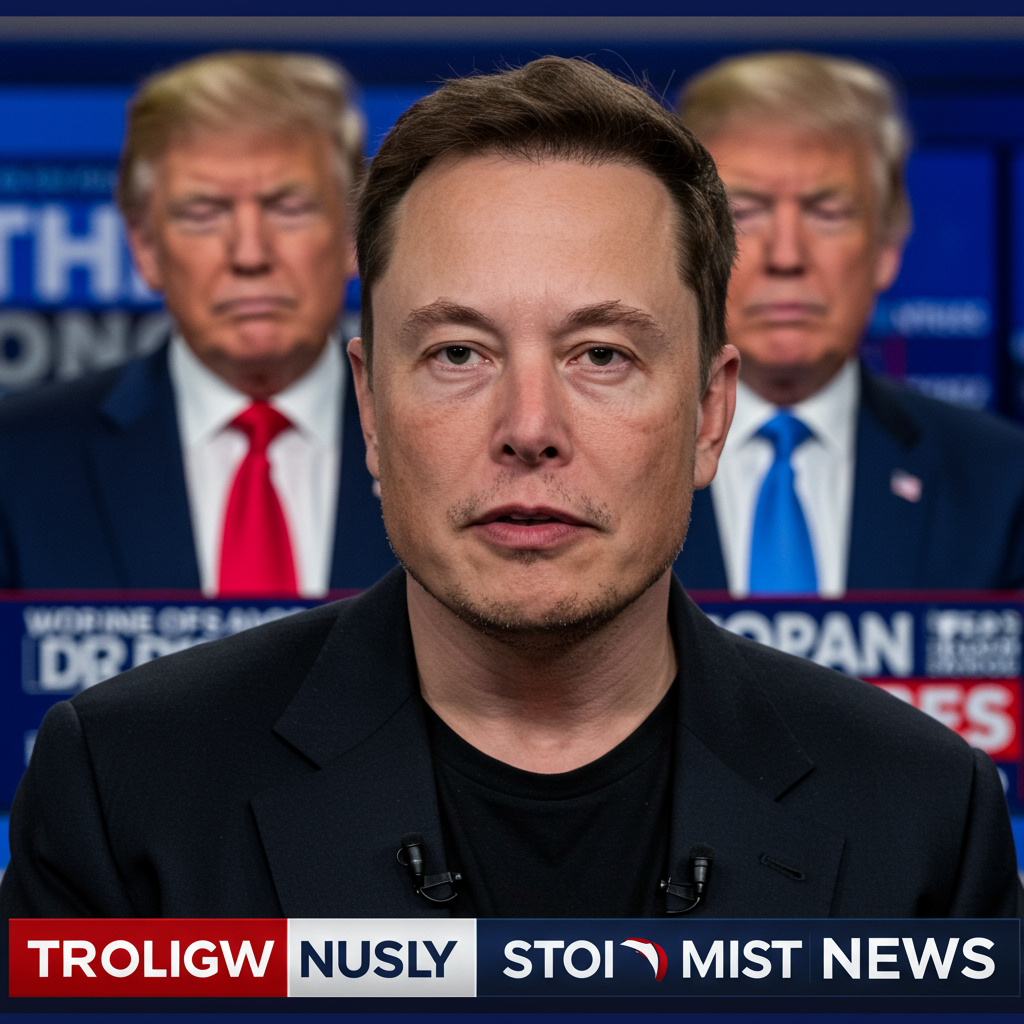Tech billionaire Elon Musk has dramatically shifted from an insider role within the Trump administration to becoming a fierce public critic of President Trump’s signature tax and spending legislation. Just weeks after serving as a “special government employee” tasked with identifying wasteful government programs under the “Department of Government Efficiency (Doge)” initiative, Musk has unleashed a torrent of condemnation against the bill, calling it a “disgusting abomination.”
His sudden opposition marks a significant divergence from his recent public support for Trump and previous substantial financial contributions to Republican campaigns, reportedly exceeding $250 million last year.
Why Musk Turned on the Bill
Musk’s primary stated reason for opposing the bill stems from his focus on reducing government spending and the national debt. He argued that the legislation, which includes multi-trillion dollar tax breaks, increased defense spending, and the extension of 2017 tax cuts, increases the budget deficit rather than decreasing it. He claimed the bill undermines the deficit reduction work he attempted during his time with the administration, where his Doge initiative aimed for $1 trillion in cuts (though the $175 billion in savings claimed lacked sufficient evidence).
In a series of pointed social media posts, Musk urged voters to contact their congressional representatives, declaring, “Bankrupting America is not OK! KILL the BILL.” He didn’t hold back on politicians who voted for it, warning that “we [will] fire all the politicians who betrayed the American people” in the next election cycle.
While his fiscal concerns are prominent, media reports have also suggested potential personal factors contributing to his shift. These include reported proposed cuts to green energy subsidies beneficial to companies like Tesla, and the withdrawal of the nomination of Jared Isaacman, a close ally of Musk, for the head of NASA.
The Bill’s Components and the Republican Challenge
The “big, beautiful bill,” as Trump has referred to it, passed the House by a single vote over unified Democratic opposition. It now faces a challenging path in the Senate. Beyond the tax cuts and spending increases, the legislation requires approximately $1.5 trillion in spending cuts to offset its costs, a requirement that has exposed and deepened existing fissures within the Republican Party.
The GOP Spending War: A Medicaid Minefield
The need to find $1.5 trillion in cuts has ignited a fierce internal battle among Republicans, particularly over proposed changes to Medicaid. This debate pits hard-line conservatives, who insist on significant spending reductions to offset tax costs, against moderate Republicans concerned about stripping benefits from millions of Americans in their districts.
Several specific Medicaid changes are reportedly on the table or have been discussed:
Spending Caps: Proposals to cap the federal government’s contribution per beneficiary, which experts warn would shift costs to states and could lead to millions losing coverage.
Work Requirements: Requiring able-bodied adults to work or participate in training, a measure the CBO estimates would save money but also result in hundreds of thousands losing health insurance.
- Enrollment Adjustments: Shortening renewal periods or undoing easier enrollment processes implemented during the Biden administration.
- https://www.bbc.com/news/articles/cvg5zpn9vkwo
- https://www.bbc.com/news/articles/c20q54vn0evo
- https://www.npr.org/2025/05/09/nx-s1-5392357/republicans-medicaid-trump-reconciliation-bill
Health policy experts note that focusing cuts on essential programs like Medicaid, which nearly 82 million Americans rely on, is politically perilous and akin to touching a “third rail.” While Republicans often frame these changes as addressing “waste, fraud, and abuse,” critics argue they primarily aim to reduce coverage and enrollment.
Key figures in this internal struggle include hard-line conservatives like Rep. Chip Roy, Sen. Rand Paul, Sen. Mike Lee, and Sen. Ron Johnson, who advocate for deep cuts, clashing with moderates like Sen. Lisa Murkowski, Sen. Susan Collins, Rep. Jeff Van Drew, and Rep. Dan Newhouse, who are wary of politically damaging cuts to popular social programs.
Musk’s Impact on the Senate Battle
Musk’s public denouncement directly complicates the bill’s passage in the Senate. Given unified Democratic opposition, Republicans can only afford to lose three votes to pass the legislation. Musk’s vocal criticism, including amplifying the views of budget hardliners like Rand Paul and Mike Lee, empowers this faction and makes it harder for leadership to find consensus. As Senator Lisa Murkowski noted, Musk is “an influencer out there, and his words have impact.”
This isn’t the first time Musk’s intervention has derailed legislative efforts; his opposition reportedly sank a government spending bill the previous year.
White House and GOP Response
The White House and Republican leaders have responded cautiously. While President Trump has stood by the bill, acknowledging he’s “not happy about certain aspects” but “thrilled” about others like the tax cuts, White House Press Secretary Karoline Leavitt maintained that Trump is sticking to his “one big, beautiful bill.” Senior Republicans like Senator Lindsey Graham have defended the legislation while acknowledging the need for more spending cuts, essentially agreeing with Musk’s core fiscal point while disagreeing with his overall condemnation. Speaker Mike Johnson has reportedly worked behind closed doors to counter Musk’s criticisms and reassure Republican members.
The Debt Ceiling Paradox
Adding another layer of complexity, the bill includes a critical provision to increase the US debt-limit borrowing authority by $4 trillion. Treasury officials warn that if the debt limit is not raised by August, the nation faces the unprecedented risk of defaulting on its national debt. Ironically, while Musk’s noisy opposition is based on concerns about unsustainable debt, his efforts to derail the bill could inadvertently prevent the debt limit increase, potentially accelerating the very financial crisis he fears.
The path forward for Trump’s spending bill remains uncertain, tangled in the complex web of internal Republican divisions and complicated significantly by the high-profile opposition of a powerful billionaire who was recently working inside the administration.



